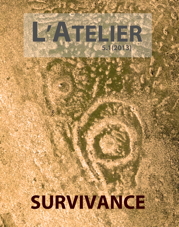Le chant de la mendiante dans Mrs Dalloway : survivance d’un dire.
Mots-clés :
Woolf, Virginia, Modernisme, ArchaïqueRésumé
L’irruption du chant de la mendiante qui se tient devant la bouche de métro de Regent’s Park dans le texte de Mrs. Dalloway crée un moment de tremblé où vacillent le langage et le temps. C’est un dire informe qui se profère avant même l’inscription d’un corps, et se fait retour à une enfance du langage et à un temps archaïque où resurgit l’immémorial. La survivance de ce temps premier dans l’actuel remet en jeu le temps de la mémoire et donne à lire la figure de la mendiante comme une figure de poétesse de l’immémorial. Sa mélopée pré-langagière, résistance sourde à la loi de l’enchaînement temporel et énonciatif, se ferait alors défi à la finitude du langage et du temps comme fondation historique, retraversant la posture d’abjection qui détermine la condition de survie sociopolitique. La « survivance » définie par Jean-François Lyotard non pas comme un état mais comme un processus sans cesse remis en jeu, comme une « naissance incessante [qui] bat le rythme d’une « survie » récurrente sans mètre (sans mesure) » serait alors à l’œuvre dans ce chant d’amour archaïque qui persiste jusqu’au cœur du présent qu’il ranime. Le sol de la ville, d’écritoire des conquêtes dans l’après-coup de la guerre, se fait indivision des strates temporelles où la boue primitive de cette préhistoire devient le creuset créateur d’un poiein mis en œuvre depuis le hors-sens. Le jaillissement d’un dire atemporel qui survit dans l’écriture en-deçà de toute condition d’énonciation, de tout récit ou sens, délie les formes du temps en un renouvellement radical qui met en crise l’expérimentation poétique.
The irruption of the song of the female beggar, standing opposite Regent’s Park Tube Station, in Mrs.Dalloway, creates a moment when language and time vacillate. A shapeless wording that is pronounced even before a body is inscribed features the return to an infancy of language and to an archaic, immemorial time. The survival of this primeval time into the present puts at stake the time of remembrance and allows a reading of the female beggar as a figure of the immemorial poet. Her pre-lingualchanting creates a muffled resistance to the law of temporal and discursive concatenation; it challenges the finitude of language and time as a historical foundation, and shatters the abject posture that proceeds from the vagrant’s condition as a socio-political survivor. “Survival” is defined by Jean-François Lyotard not asa state but as a continuously renewed process, an “incessant birththat beats the rhythm of a recurring “survival” without any meter (or measure)”. This process is at work in the archaic love song that persists into the core of the present, and revives it. The ground of the city relinquishes its status as a writing surface for conquests to inscribe themselves, in the aftermath of the World War I, and becomes a fertile soil made of undivided temporal strata,where the primeval mud of this prehistory becomes the creative melting pot of the poiein, a poetic process that works outside any meaning. The surging of an atemporal wording that survives in the writing beneath any enunciation, any narrative or anysense, allows time to break free and the poetic experimentation to be radically renewed.
Publiée
Numéro
Rubrique
Licence
-
L’envoi spontané d’un article à la rédaction de L’Atelier implique l’autorisation de publication et la cession des droits dans les limites établies par la loi de propriété intellectuelle.
-
L’Atelier conserve les droits de reproduction des articles publiés, quelque soit le support : internet, CD ROM, réimpression, photocopie, etc.
-
L’auteur conserve le droit de publier ultérieurement son article déjà paru dans L’Atelier avec la seule obligation de mentionner le nom de la revue comme source de la première publication.


